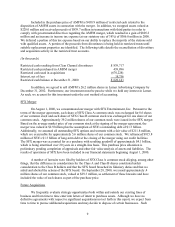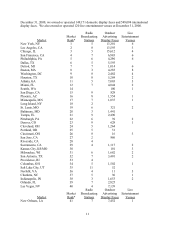iHeartMedia 2000 Annual Report Download - page 17
Download and view the complete annual report
Please find page 17 of the 2000 iHeartMedia annual report below. You can navigate through the pages in the report by either clicking on the pages listed below, or by using the keyword search tool below to find specific information within the annual report.
17
License Grant and Renewal
Prior to the passage of the 1996 Act, television and radio broadcasting licenses generally were
granted or renewed for periods of five and seven years, respectively, upon a finding by the FCC that the
“public interest, convenience, and necessity” would be served thereby. At the time an application is made
for renewal of a television or radio license, parties in interest may file petitions to deny the application,
and others may object informally to grant of the application. Such parties, including members of the
public, may comment upon matters related to whether renewal is warranted, including the service the
station has provided during the preceding license term. Prior to passage of the 1996 Act, any person or
entity also was permitted to file a competing application for authority to operate on the station’ s channel
and replace the incumbent licensee. Renewal applications were granted without a hearing if there were
no competing applications and if issues raised by petitioners to deny or informal objectors to such
applications were not serious enough to cause the FCC to order a hearing. If competing applications were
filed, or if sufficiently serious issues were raised by a petitioner or objector, a full hearing was required.
Under the 1996 Act, the statutory restriction on the length of broadcast licenses has been
amended, and the FCC now grants broadcast licenses to both television and radio stations for terms of up
to eight years. The 1996 Act also requires renewal of a broadcast license if the FCC finds that
• the station has served the public interest, convenience, and necessity;
• there have been no serious violations of either the Communications Act or the FCC’ s rules and
regulations by the licensee; and
• there have been no other serious violations which taken together constitute a pattern of abuse.
In making its determination, the FCC may still consider petitions to deny and informal objections, and
may order a hearing if such petitions or objections raise sufficiently serious issues. The FCC, however,
may no longer consider whether the public interest would be better served by a person or entity other than
the renewal applicant. Instead, under the 1996 Act, competing applications for the incumbent’ s spectrum
may be accepted only after the FCC has denied the incumbent’ s application for renewal of license.
Although in the vast majority of cases broadcast licenses are renewed by the FCC even when
petitions to deny or informal objections are filed, there can be no assurance that any of our stations’
licenses will be renewed at the expiration of their terms.
Multiple Ownership Restrictions
The FCC has promulgated rules that, among other things, limit the ability of individuals and
entities to own or have an “attributable interest” in broadcast stations and other specified mass media
entities. Prior to the passage of the 1996 Act, these rules included limits on the number of radio and
television stations that could be owned on both a national and local basis. On a national basis, the rules
generally precluded any individual or entity from having an attributable interest in more than 20 AM
radio stations, 20 FM radio stations and 12 television stations. Moreover, the aggregate audience reach of
the co-owned television stations could not exceed 25% of all U.S. television households.
The 1996 Act completely revised the television and radio ownership rules via changes the FCC
implemented in two orders issued on March 8, 1996. With respect to television, the 1996 Act and the
FCC’ s subsequently issued orders eliminated the 12-station national limit for station ownership and
increased the national audience reach limitation from 25% to 35%. On a local basis, however, the 1996
Act did not alter FCC rules prohibiting an individual or entity from holding an attributable interest in
more than one televis ion station in a market. The 1996 Act did require the FCC to conduct a rulemaking
























